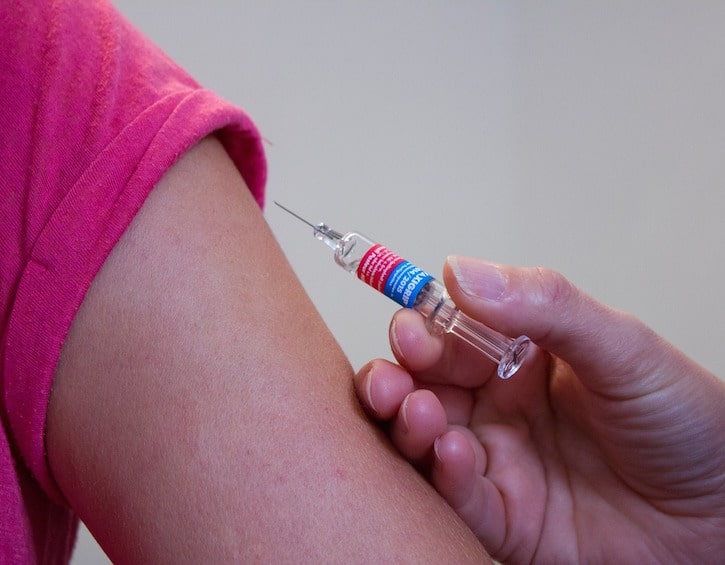
Our medical expert weighs in about the crucial importance of vaccines during pregnancy.
We all know about the debate raging around the world about vaccines for kids, but what about pregnant mamas? Please welcome Dr Lucy Lord, an OBGYN at Hong Kong’s Central Health Medical Practice, with the latest research and medical recommendations for vaccines in pregnancy. As ever, we know you smart mamas can make your own decisions, we just want you to be as informed as possible!
Pregnant women are more vulnerable to infections because their immune system is stepped down in order to tolerate foreign foetal proteins present on the surface of placental membranes.
In addition, many viruses can threaten the growth of the embryo. Other infections may be associated with blindness, neurodevelopmental delay, cerebral palsy and stillbirth. Once the foetal placental unit is compromised by infection, it is difficult to treat because it is an immune privileged site; that is, the mother’s mature immune system has limited access to infection in the baby, placenta and amniotic fluid.
It would be irresponsible for any medical practice not to have a clear strategy for preventing infections from harming their pregnant patients and their children. Vaccination is one of our most important tools!
This is our strategy on vaccines:

Preconception
Where vaccination gives long standing immunity, it should be done before pregnancy as part of a preconception check.
We would normally check vaccine records and/or levels of immunity 3 to 6 months prior to our patients planning to conceive. Vaccines offered – if the patient is not already immune or up to date – would include:
- MMR
- Varicella
- Hepatitis B
- Tetanus booster or course if not previously vaccinated.
- Yellow fever if unavoidable travel to endemic areas
- Japanese encephalitis vaccine if unavoidable travel to endemic areas
- Typhoid if unavoidable travel to high risk areas
- HPV if indicated
During Pregnancy
We would only give vaccines that clearly reduce risk to mother and or baby, including:

1) Influenza vaccine: Pregnant women are at increased risk for serious illness from seasonal and pandemic influenza because the immune system changes during pregnancy. These changes appear to place women at increased risk for illness and influenza-related complications. It is therefore critical that women receive influenza vaccination during pregnancy.
This opinion has been backed up by the Committee on Obstetric Practice and Immunization Expert Work Group of the American College of Obstetricians and Gynecologists (ACOG), published in the September issue of Obstetrics and Gynaecology.
Recent data continue to show that the vaccine is safe for pregnant women and their newborns, which should be reassuring to patients and clinicians alike. Moreover, other studies have shown that newer quadrivalent vaccines (which cover four different strains of influenza, versus the traditional trivalent vaccine) are safe and appropriate for use in pregnant women as well.
At this time, approximately 50% of pregnant women are immunized against influenza. Pregnant women who receive a recommendation for the influenza vaccine from their obstetrician or obstetric provider are 5-fold to 50- fold more likely to be immunized, so talk to your healthcare provider about it!
Influenza prevention is also important during preconception and during both prenatal and postpartum care. The inactivated influenza vaccine can be given to women at any stage of pregnancy. However, the live attenuated vaccine is not recommended for pregnant women, but can be used safely during the postnatal period.
The recommendation includes vaccines both with and without thimerosal, an antiseptic and antifungal agent.

2) Pertussis (Whooping Cough) vaccine: In 2010, there were 27,550 cases of Pertussis reported in the US – the most cases since 1959; 3,350 of those cases were in infants younger than 6 months of age, and 25 of those infants died. Worldwide, there are an estimated 30-50 million cases per year, and 300,000 deaths. Studies have shown that the mothers transferred 30–40% of those infections.
Pertussis (Whooping cough) can cause serious and sometimes life-threatening complications in infants, especially within the first 6 months of life. More than half of infants less than one year of age who get Pertussis require hospitalization, 2/3 suffer apneic spells (spells of breathing cessation) and 1 or 2 in 100 die.
Currently the first scheduled Pertussis vaccination is at 2 months of age and good protection is not achieved until at least 6 months of age.
When a woman is vaccinated against Pertussis during her pregnancy, protective antibodies are produced which transfer across to the baby and protect the newborn.
The ACIP has concluded that there is no elevated frequency or any unusual occurrence of adverse events among pregnant women who have received Tdap (Tetanus, Diptheria, Pertussis) vaccine or in their newborns, and recommends proactive vaccination for pregnant women after 20 weeks gestation.
The immune response to the vaccine peaks two weeks after administration, so the ideal time for vaccination is 32 to 36 weeks earlier if there is any risk of prematurity.
The vaccine does not affect breastfeeding after birth. Aside from vaccinating pregnant women, all caregivers of young infants including helpers, fathers, siblings and other relatives, should an have up-to-date Pertussis vaccination.
3) Tetanus is crucial for pregnant women with unknown or incomplete tetanus vaccination. To ensure protection against maternal and neonatal tetanus, pregnant women who have never been vaccinated against tetanus should receive three vaccinations containing tetanus and reduced diphtheria toxoids. The recommended schedule is 0, 4 weeks, and 6 months. Tdap should replace the last Td at 32 to 36 weeks as it includes whooping cough.
Postpartum Vaccination
The postpartum period remains high risk with lowered immunity for the mother and contact vulnerability for the baby. We would recommend the flu vaccine and pertussis vaccine if not given in pregnancy, and any missed pre-conceptual vaccines:
- MMR
- Varicella
- Hepatitis B
- Tetanus booster or course if not previously vaccinated
- Yellow fever if unavoidable travel to endemic areas
- Japanese encephalitis vaccine if unavoidable travel to endemic areas
- Typhoid if unavoidable travel to high risk areas
- HPV if indicated
Thanks, Dr Lord! For more info, mamas, be sure to check out the super-informative website Immunization for Women!
 View All
View All


 View All
View All


 View All
View All

 View All
View All
 View All
View All


 View All
View All







